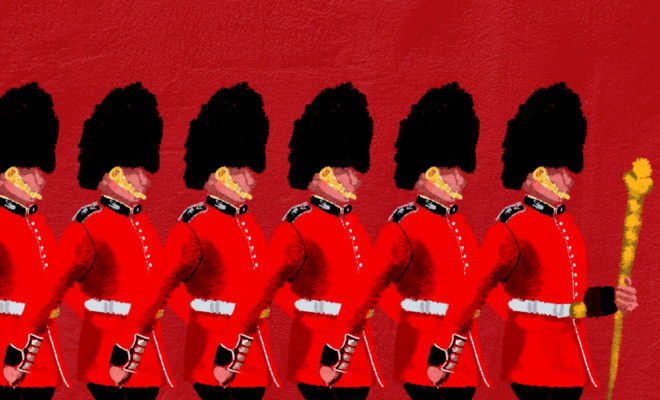
Literature
Beach Reads: The Band Played On
By Grier Ferguson | Illustration by Darcy Kelly-Laviolette | July/August 2021
Milton’s gray wool cap was worn, but he was not a man to leave the house without a cap, even on a warm London morning in July.
As he placed his cap atop the few white wisps of hair he had left, he looked in the entryway mirror. Adjusting the hat so it pointed straight to the front, he glanced down at the photograph tucked into the space between the edge of the mirror and its wood frame.
The photograph was not the nicest one he had of her – it was not the one taken by the professional at their wedding that he kept in a frame in the living room – but it was his favorite photograph. He snapped it as they left for a weekend at Brighton Beach in 1955, a couple of years after they got married.
Just as she stepped onto the train that day, she had turned to look back at him. He had said something he could no longer remember and she had started to laugh, her head tilting back and her strawberry blonde curls falling on her shoulders.
Milton winked at the photo as if his late wife would leap off the glossy paper into the hall. He waited a moment, almost as if to give it a chance to happen, and then he ducked his head down, picked up the umbrella he kept by the mirror, and opened the front door.
Squinting as he looked up at the sun, Milton noticed there weren’t any clouds in the sky. But he was a practiced Londoner, always prepared with umbrella in hand. Plus, he liked that it doubled as a distinguished walking stick.
As he walked down the block to the West Ham Tube stop, he began to perspire underneath his long-sleeve button-down shirt and tan wool vest.
Maybe another shirt would have been better today and maybe he should have left the vest at home, but he wore a rotating combination of wool cap, wool vest, and wool trousers every day, and this day was no different. He was used to wearing a uniform.
When he got to the station, he stepped lightly onto the escalator and then off of it when he reached the busy platform.
Once the right train arrived, he timed his entry so that he wouldn’t be jostled or even toppled in the initial hurried exodus of passengers. The umbrella came in handy here, and Milton used it to pace himself and make steady progress to the car.
“Sorry,” Milton said as he lost his balance just a little on the platform and grazed the side of a man in a suit carrying a briefcase.
“So sorry,” the man said back, not missing a beat of British civility.
The man made sure Milton was steady on his feet and then hurried off into the crowd leaving the station.
Milton stepped into the car and found a seat across from a young girl with a backpack and pleated skirt seated next to her mother. He pulled his cap down again to make sure it was secure on his head and then smiled at them.
“Aren’t you hot?” the girl asked.
“Jenny, don’t be rude,” her mother scolded. She turned to Milton. “I’m sorry.”
“It’s ok,” Milton said. “I am a little warm, but I’m used to it. I used to wear wool when I played.”
“When you played?” the girl asked.
“I was in a band,” Milton said. “I played the trumpet.”
The train slowed, and Milton held onto the metal pole by his side to keep from leaning into a teenager with a jet-black mohawk.
“This is our stop,” the girl said as she and her mother stood up. “Bye!”
“Have a nice day,” the mother said.
They stepped off the train, and Milton hoisted himself out of the seat with his umbrella and stood up. He had reached his destination, too – St. James’s Park station.
The time was getting close. He had walked slower today and gotten on a later train than usual.
When he emerged from the station, he squinted and put his hand up to the brim of his cap to shield his eyes from the bright sunlight. A block or two away, he could hear it.
The notes were rising on the air, the drumbeats echoing toward him, then away from him.
He walked closer. Soon he could see the red of their uniforms against the sea of tourists in t-shirts, shorts, and flip flops.
A girl who looked to be about three sat on her dad’s shoulders to get a better look. A pregnant woman stood with her hand on her back watching as they passed by. A young man in a camouflage shirt saluted.
Milton was standing right in front of the band now, but they kept moving, making their solemn, steady way from Wellington Barracks to Buckingham Palace, leading the New Guard.
For a moment, Milton closed his eyes and the drumbeats and the crowd and the Palace faded away so the only sound he heard was the trumpets. And then, a second later, just a single trumpet, sounding its brave, triumphant tune.
When he opened his eyes, the Old Guard was handing the Palace keys to the New Guard as the band played on.
Milton pushed out of the crowd and found a clear path of pavement. The band began to lead the Old Guard’s procession back to Wellington Barracks, and he followed along, keeping up in time as he hummed along to the music.
He would walk with them back to the barracks, then make his way to St. James’s Park station and take the Tube home to West Ham again where he would enjoy a late lunch and an early supper and then head to bed.
The next morning, he would wake up at eight and begin to get ready. When it was time to leave, he would stop in the entryway to straighten his cap in the mirror, wink at the photograph of his wife, and set out for the Palace.

About the Author: Grier Ferguson
Grier Ferguson is director of communications for Church of the Redeemer. Previously, she was a reporter and editor for the Business Observer newspaper. She has a degree in journalism from the University of Florida. A trip to London inspired the character of Milton.



You must be logged in to post a comment Login